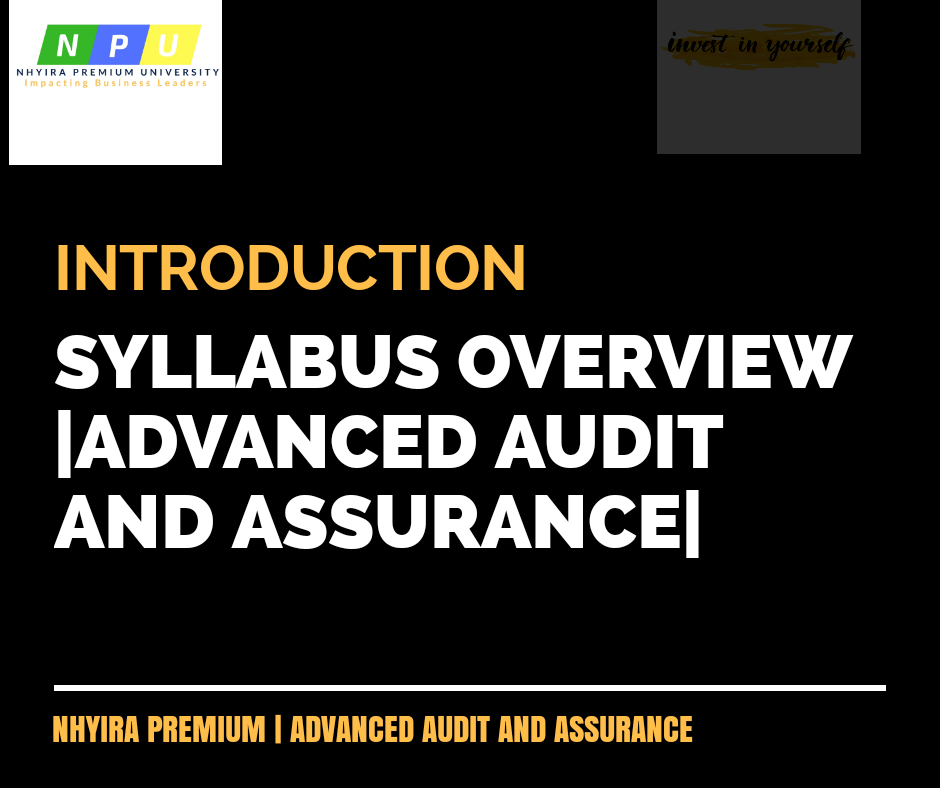MODEL 1 – OVERVIEW OF SYLLABUS
For the purpose of how I am going to teach and handle the subject, I have divided the syllabus into three major parts. This will enable us to effectively understand the subject and know how to apply your knowledge both in the examination and the real business issues in practice.
These include the following:
[vooplayer type=”video” id=”NjM5NTk=” float=”right-25%” ]
- BEFORE ASSURANCE SERVICE:
Under this segment of the syllabus, we will be discussing with you the various issues and considerations that the auditor considers before accepting an audit appointment or before issuing an engagement letter.
To understand this, we have to first understand that there are two things we must take note of:
i. Audit and Assurance:
This refers to the critical analysis of the financial statements of a client in a careful manner and issuing an audit report.
ii. Non- Audit and Assurance:
This refers to other services that the auditor may render to client apart from auditing of the financial statements.
NOTE: FOR THE REST OF THIS SEGMENT, WE WILL TALK ABOUT AUDIT AND ASSURANCE.
Let’s discuss the first segment briefly by talking about five major things:
a. Advertisement:
This refers to the awareness that the auditor creates to make services available to the public through publicity. We will discuss the guidelines that must be taken into consideration through or during advertising.
Tendering:
After advertising, our firm will be invited to meet the tendering board or committee of the client and there are some factors that need to be considered on how to prepare our tendering documents to stand out.
Quality Control:
This refers to making sure that the quality of our audit work is high, which means sticking to the International Standards of Auditing (ISAs).
Factors to consider:
These are the specific factors in relation to the client we are considering; these include the industry of the client among others.
Ethics:
These refer to the International Federation of Accountants (IFAC) codes of ethics that we must consider before accepting auditing.
Money Laundering:
This is a very important issue which involves how organisations or individuals getting money through illegal or criminal mean.
DURING ASSURANCE SERVICE:
This is a very important section of the syllabus and we will be doing a lot here. The reason is that, most of what we are going to do as auditors in practices or in the exams largely depends on how we understand this segment of the syllabus.
There are three major things we have to consider here:
- Singly Company Financial Statement Audit:
This involves how the auditor can audit the financial statements of a company.
Remember there are six (6) stages of auditing financial statements and you must remember your accounting standards. These include:
- Signing contract / engagement letter
- Planning the audit
iii. Audit procedures
- Substantive Auditing
- Reviewing
- Issuing audit report
- Group Company Financial Audit:
This is where we draw knowledge on Corporate Reporting. The additional Accounting Standards to follow; IFRS 3 (Business Combination), IFRS 10 (Control definitions), IFRS 11 (Joint arrangement), IFRS 12 (disclosures), among others.
- Other Assurance Services:
- Review on cash flow forecast
- Forensic investigation: This is an assurance service where the client’s management realises an issue of fraud and employs us to investigate through it.
- Public Sector Audit.
- Current Issues:
It is something that relates to the future or the ‘hot’ topic discussion.
- Changes in Audit Report
- Joint/ Transnational Audit; etc.
SPECIFIC OBJECTIVES
On successful completion of this paper candidates should be able to:
- Recognise the legal and regulatory environment and its impact on audit and assurance practice
- Demonstrate the ability to work effectively on an assurance or other service engagement within a professional and ethical framework
- Assess and recommend appropriate quality control policies and procedures in practice management and recognise the auditor’s position in relation to the acceptance and retention of professional appointments
- Identify and formulate the work required to meet the objectives of audit assignments and apply the International Standards on Auditing
- Identify and formulate the work required to meet the objectives of non-audit assignments
- Evaluate findings and the results of work performed and draft suitable reports on assignments
- Understand the current issues and developments relating to the provision of audit related and assurance service
Enroll in the course here
You tube Channel here

